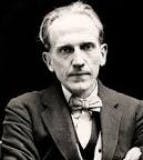English writer, humorist. He is best known for his creation of the children's literature character Winnie the Pooh.
He was educated at a private school founded by his father and taught by Herbert Wells from 1889 to 1890. Later he attended Westminster School in London, St. Paul's School in Cambridge and St. Peter's School in London. He went on to study mathematics at Cambridge and Trinity College. While still at college, he wrote for Granta magazine. After graduating in 1903, he returned to London and worked as a freelance writer, writing satire for Punch from 1906 to 1914, where he was one of its editors.
In 1915, although a pacifist, he took part in World War I as a signal officer. He served in France, but soon fell ill and was sent home.
During the Second World War he was a captain in the British Guards. He later retired to the country and was invalided out of the country in 1952 after a stroke and surgery.
A. A. Milne became famous for his drawing-room comedy Mr. Pimm Passes By (1919), which describes the complicated relationships of a family. Later, he wrote other plays, mostly humorous in nature, such as The Stepmother (1920), The Truth about Blayds (1921) and The Dover Road (1921).), Give Me Yesterday (1923), Portrait of a Gentleman in Slippers (1926), Michael and Mary (1930).), Other People's Lives (1933), Miss Elizabeth Bennett (1936), The Ugly Duckling (1941).
He also wrote a detective novel, The Red House Mystery (1922), and collections of children's poetry, When We Were Very Young (1924), In 1926, he wrote his most famous work, Winnie-the-Pooh (1958 and 2008), followed by its sequel, The House at Pooh Corner (1928),
Later, A. A. Milne also wrote a memoir, It's Too Late Now (1938), and a philosophical poem, The Norman Church (1948).
